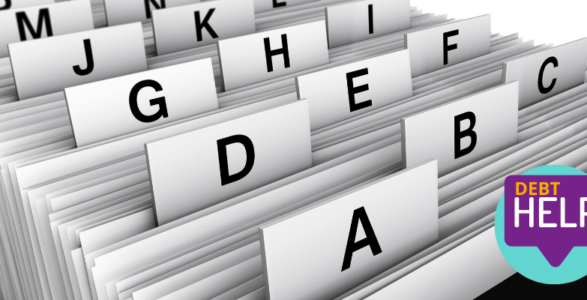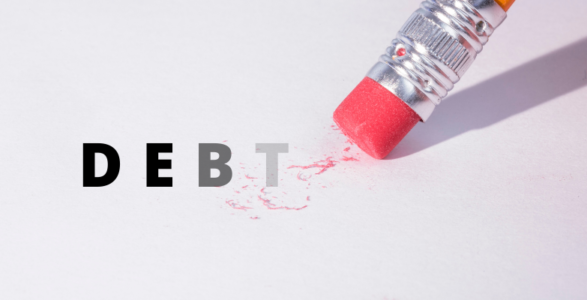IVA or Bankruptcy?

16 April 2019
An Individual Voluntary Arrangement (IVA) and bankruptcy are both insolvency solutions. Insolvency is the state of being unable to pay monies owed.
IVAs and bankruptcy are formal and legally-binding agreements between the debtor (a person or company that owes money) and their creditors ( a person or company to whom money is owing). They both typically involve a significant amount of debt being written off. Both of these debt solutions have to be approved by the court.
There are similarities between IVA and bankruptcy but they work differently; each has pros and cons.
This article gives an overview of each of them. However it’s important that you seek expert debt advice if you find yourself struggling with debt.
What is an IVA?
An IVA is an agreement that is made with your creditors to pay off your debts over a set period of time. An IVA must be set up and managed by an insolvency practitioner who will charge a fee for the IVA. Fees usually average £5000.
What is Bankruptcy?
You can apply for bankruptcy if you can’t pay back your debts. Bankruptcy application costs £680 made up of an adjudicator fee of £130 and a deposit of £550. A creditor can apply to make you bankrupt, even if you don’t want them to. For a creditor to make you bankrupt, you must owe at least £5,000.
How long will an IVA and bankruptcy take to be discharged?
IVA – If you comply with the terms of your IVA it typically lasts for 5 years.
Bankruptcy – If you comply with the terms of your bankruptcy, it will be discharged after 12 months.
How Your Job Could Be Affected by an IVA or Bankruptcy
Some workplaces include it as a condition of employment that you cannot become insolvent, which would mean that both an IVA and bankruptcy could affect your ability to keep your job.
Some specific jobs might be affected if you’re on an IVA or go bankrupt. Insolvency might cause problems for:
- Company directors
- Law and property roles
- Finance and accountancy roles
- Pub licensees
The best way to find out if an IVA or bankruptcy would impact on your job is to check with your professional membership body and read your contract.
How Your Home Could Be Affected by an IVA or Bankruptcy
The affect an IVA or bankruptcy will have on your home depends on whether you rent or own your own home.
You Rent Your Home
IVA – If you rent with an IVA it’s very unlikely that you would need to move home.
Bankruptcy – If you rent when go bankrupt, you can usually stay, as long as you are not behind in your rent. You would need to check your tenancy agreement as some private landlords include a clause which means you could be asked to leave if you go bankrupt.
You Own Your Home
IVA – If you own your home during an IVA you will not be forced to sell it. However you could be asked to remortgage six months prior to the end of your IVA if you have equity of £5000 or more. If this isn’t affordable for you, you may have to extend your IVA for 12 months.
Bankruptcy – If you own your home and go bankrupt you may have to sell your home to repay the debt. A home with with £1000.00 equity or less is considered low value and may not be sold as part of the bankruptcy.
Pros of IVA
- It’s affordable as your monthly IVA repayments will be based on your specific income and outgoings, ensuring it is an amount you can afford.
- You won’t have to sell your home.
- Legal action by your creditors will stop.
- You will be free of debt in an agreed number of years.
- Interest on your debts is frozen at the time of the IVA.
- Avoid being made bankrupt.
Cons of IVA
- Creditors do have to agree to an IVA, therefore it isn’t guaranteed.
- The monthly payments will be affordable, but are likely to mean quite a tight budget while the debt is repaid.
- It will affect your credit score and remain on your credit report for six years from the date your creditors agree to it or until your IVA is finished, if it lasts longer than six years.
- Your IVA will be listed on the Individual Insolvency Service register and so will be public record.
- You will pay fees to the IVA company.
- Not all debts can be included in the IVA such as court imposed fines.
- You may have to sell any really high value assets and downgrade, such as exchanging a luxury car for a more economical one.
- Under an IVA, you may have to pay more to creditors than you would do if you became bankrupt, and for a longer period.
Pros of Bankruptcy
- You could be debt free in just 12 months.
- You won’t need to deal with your creditors.
- You’re allowed to keep certain things, like household goods and a reasonable amount to live on
- creditors have to stop most types of court action to get their money back following a bankruptcy order
- Creditors can’t take any further action against you unless their debts are secured against your property.
- The money you owe can usually be written off
Cons of Bankruptcy
- if your income is high enough, you’ll be asked to make payments towards your debts for 3 years
- You won’t be in control of your property or other assets.
- Your bank account may be frozen for the Official Receiver to review your finances.
- You may lose your home to pay back your creditors.
- You may not be able to work in certain professions
- Your bankruptcy will be made public
- if you are, or are about to be, the right age to get your pension savings, these might be taken
Compass Vehicle Services Ltd offer:
nationwide car leasing – bad credit car finance – used car deals – personal leasing – business car leasing – best car lease deals – non-status car leasing
Back to all help and advice articles



